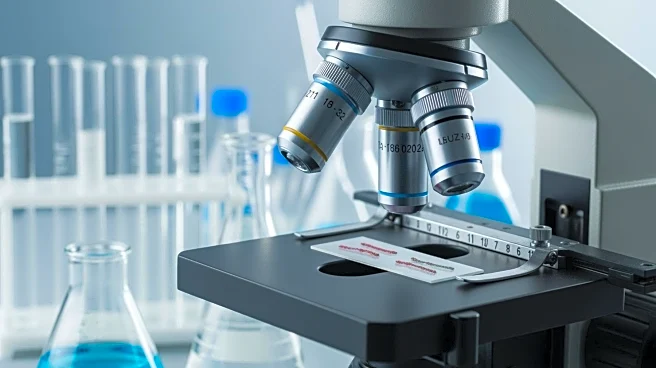What's Happening?
BioTechniques Editor-in-Chief Michelle Itano from the University of North Carolina, Chapel Hill, has shared key articles from the journal's recent issues, focusing on advancements in chromosome preparation and protein interaction studies. One highlighted
study presents an optimized protocol for preparing chromosomes from the HeLa cell line, aiming to increase yield by recovering chromosomes from discarded cell fractions. This method is significant for cytogenetic analysis and could extend to other cell lines. Another study introduces the use of the LexA-E. coli two-hybrid system to study human protein-protein interactions, specifically between Prostate Apoptosis Response-4 and Glucose-Regulated Protein 78, offering a cost-effective alternative to eukaryotic systems. Additionally, a protocol for non-destructive DNA extraction from small organisms preserved in DESS is detailed, facilitating DNA barcoding without damaging specimens.
Why It's Important?
These studies represent significant advancements in molecular biology and genetics, potentially impacting clinical diagnostics and research methodologies. The optimized chromosome preparation protocol could enhance cytogenetic analysis, crucial for genetic research and diagnostics. The LexA-E. coli system offers a low-cost method for studying protein interactions, beneficial for resource-limited labs and educational settings. The non-destructive DNA extraction protocol supports ecological and taxonomic studies by preserving specimen integrity, broadening the scope of DNA barcoding applications. These innovations could lead to more efficient research processes and expanded scientific understanding.
What's Next?
The protocols introduced in these studies may lead to broader applications in various research fields. The chromosome preparation method could be adapted for other cell lines, enhancing cytogenetic studies. The LexA-E. coli system might be integrated into more labs, facilitating protein interaction research without the need for eukaryotic systems. The DNA extraction protocol could be adopted in ecological studies, promoting non-invasive research methods. Researchers and institutions may explore these methods further, potentially leading to new discoveries and improved research techniques.
Beyond the Headlines
The development of these protocols highlights the ongoing innovation in scientific research, emphasizing the importance of cost-effective and sustainable methods. The ability to conduct non-destructive DNA extraction and study protein interactions in simpler systems reflects a shift towards more accessible and inclusive research practices. These advancements may encourage collaboration across disciplines, fostering a more integrated approach to scientific inquiry.

















